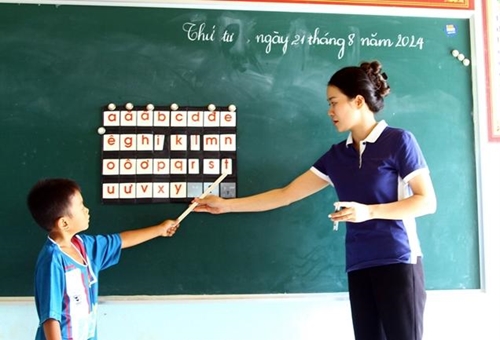The initiative, which involves two sessions of teaching per day, aims to enhance instruction in cultural and artistic subjects, thereby supporting students' holistic development.
The order was made under a statement from the Office of the Party Central Committee, which outlined Lam's conclusions following a working session on April 18 with the Government and relevant ministries regarding the implementation of the Party's resolutions on education and training.
    |
 |
|
A teacher and a student in class at Thuong Hoa Primary and Secondary School in Minh Hoa district, in the Central coastal province of Quang Binh. |
The session also addressed preparations for a new Politburo resolution on transformative education policies and support measures for teaching and learning.
After reviewing a report from the Party Committee of the Ministry of Education and Training and listening to opinions from other agencies, Lam endorsed a policy allowing primary and secondary schools to organize full-day teaching, depending on each locality’s capacity in terms of infrastructure, finance and staffing.
The plan will be rolled out gradually, with the State taking the lead on investment while encouraging support from the private sector.
The Party chief tasked the Government’s Party Committee with directing the education ministry and other authorities to ensure all necessary conditions, facilities, staff, curricula and educational activities are in place to improve the quality of teaching in the full-day programs.
Free school lunches
Lam also agreed to a policy supporting lunch meals for students in border communes, prioritizing mountainous areas. This includes both ethnic minority students and Kinh students residing in such regions.
Localities are urged to develop boarding and semi-boarding schools to facilitate learning and living conditions for students.
Infrastructure standards for schools must include adequate classrooms, science labs, clean water, kitchens, bathrooms, toilets, playgrounds and teacher accommodation.
Border communes should include instruction in neighboring countries’ languages to enhance future cross-border people-to-people exchanges.
The policy will be introduced in phases, aligned with the national economic situation.
Strict supervision is required during implementation and any misappropriation of students' meal provisions will not be tolerated.
Initially, the program will be piloted in land border communes starting in September, with gradual nationwide expansion based on the outcomes.
Localities able to allocate budgetary resources are encouraged to implement the scheme immediately within their jurisdictions.
The Party Committee of the education ministry has been assigned to coordinate with relevant agencies and report to the Government’s Party Committee on implementation progress.
Matters beyond their authority will be referred to the Politburo for review and decision.
Top national priorities
Lam said that education, training and science and technology remain top national priorities.
Significant policies and reforms have already yielded substantial results, contributing meaningfully to national development.
However, the education system still lacks the transformative progress needed to meet public expectations, especially in developing well-rounded citizens and a high-quality workforce, amid both domestic and global challenges.
Despite various national target programs, students in remote, ethnic minority-inhabited and mountainous areas continue to face severe hardships, with low enrolment rates.
The situation stems largely from systemic limitations, particularly in mindset, policy frameworks, governance and resource allocation, which have hindered progress in the sector.
There is now a pressing need to train a new generation of Vietnamese citizens who are well-rounded and capable of meeting the nation’s dual centennial goals, including developing a highly skilled workforce that is key to driving breakthroughs in science, technology, innovation and digital transformation.
In tandem with economic growth, social advancement must also be prioritized, ensuring equal access to quality education, lifelong learning opportunities, and the full development of individual potential.
In response to the urgent demands, the Party leader stressed the need for bold institutional and policy reforms, targeted investment and accelerated modernization to improve educational outcomes and develop a workforce capable of powering Vietnam’s next stage of national advancement.
Source: VNA